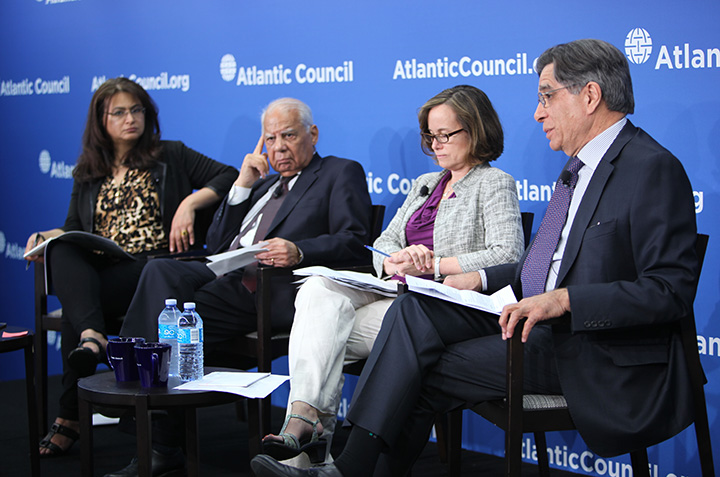
Political instability, insecurity seen hurting foreign investment, tourism
The Egyptian economy is “in the doldrums” as a result of political instability and insecurity that have led to inconsistent economic policies and depressed foreign investment, said Mohsin Khan, a nonresident senior fellow at the Atlantic Council’s Rafik Hariri Center for the Middle East.
Khan spoke in a discussion on Egypt’s economic prospects on June 15. He was joined on the panel by Hazem Beblawi, a former prime minister of Egypt who currently serves as an executive director of the International Monetary Fund and Caroline Freund, a senior fellow at the Peterson Institute for International Economics. Mirette F. Mabrouk, deputy director of the Rafik Hariri Center, moderated the discussion.
Khan is the author of a new report entitled “The Economic Decline of Egypt After the 2011 Uprising,” which details the reasons behind Egypt’s continuing economic decline. Elissa Miller, a program assistant at the Rafik Hariri Center, is a co-author of the report.
Egyptian President Abdel Fattah el-Sisi assumed power almost a year after ousting Egypt’s first democratically elected president, Mohamed Morsi, in July of 2013. The el-Sisi government has cut subsidies by a small margin and vowed to cut them further. However, subsidies still make up 8.5 percent of Egypt’s GDP, which lends itself to unsustainable economic stability.
“One of the problems among Egyptians and policymakers is that they do not appreciate the real situation of the country,” Beblawi said referring to Egypt’s current dire economic environment.
For the past five years, Egyptians have felt the impact of economic decline. As Ramadan progresses, even basic necessities become nearly unaffordable. The Egyptian government seems overwhelmed by the extent of the crisis and has thus far been unable to reverse the downward economic trends.
Beblawi identified four major constraints on the Egyptian economy: rapid population growth that has fueled high unemployment rates, a lack of natural resources, a highly inefficient bureaucracy, and a high rate of consumption—Egyptians consume eighty-five percent or more of their income—that has led to low rates of saving. Each of these factors has created a big hurdle for policy makers tasked with drafting monetary policy.
Not everyone agreed with Beblawi’s sentiment, however. Freund contended that rather than being an economic hindrance, the large pool of unemployed workers could actually attract job-creating foreign investment that Egypt desperately needs. Companies that may want to open up factories or other businesses in Egypt could benefit from such a readily available supply of workers.
Beblawi, who served as interim prime minister from July 2013 to March 2014, noted the impact of Egypt’s historical economic policies, saying “when we started to try to industrialize the country the best approach was to adopt import substitution…In the Egyptian economy, a country with very low natural resources industry depends on…imports. So, industry means we incur our costs in foreign exchange.”
He concluded that Egypt’s attempts to industrialize undermined the long-term effectiveness of the country’s economic structure and the quality of goods.
However, Beblawi’s assessment was not all negative.
“While the state, in its current form, is in its adolescence, it will soon grow into its role,” he said.
“There is a lot of reason to be optimistic about the future of local energy production in Egypt,” he added citing an abundance of resources for the production of natural gas and solar-based energy.
While looking at ways to develop a more robust Egyptian economy, all of the panelists emphasized the importance of changing the current exchange rate regime, thereby moving from a fixed exchange rate (tied to the US dollar) to one that is more flexible. While Beblawi stressed that a change in the exchange rate regime alone would not save the Egyptian economy, he did say that it was an important step in the right direction.
In the past five years, Egypt has gone through massive political and economic turmoil. The effects of these changes on the population have been obvious, driving up prices and unemployment. But, the panelists agreed, there is reason to be hopeful when considering Egypt’s economic future.
Julia Goldman is an intern at the Atlantic Council. You can follow her on Twitter @juliafgoldman1.
Image: From left: Mirette F. Mabrouk, deputy director of the Atlantic Council’s Rafik Hariri Center for the Middle East, moderated a panel discussion on the Egyptian economy with Hazem Beblawi, a former prime minister of Egypt; Caroline Freund, a senior fellow at the Peterson Institute for International Economics; and Mohsin Khan, a nonresident senior fellow at the Hariri Center, in Washington on June 15. (Atlantic Council/Victoria Langton)
